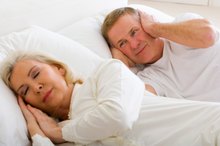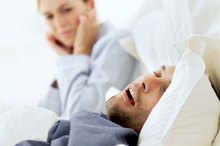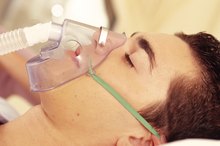Long-Term Effects From Using a CPAP Machine
CPAP stands for Continuous Positive Airway Pressure. CPAP is used by people with obstructive sleep apnea syndrome (OSAS) during the night to help keep their airways open. CPAP can be delivered either by mask or by nasal cannula. OSAS is diagnosed by sleep studies that show that sufferers stop breathing many times in the night, although they’re not aware of it. There are a few side effects--some positive, some negative--associated with long-term CPAP use.
Positive Effects
According to an article published in the "European Respiratory Journal" in 2000, long-term advantages noted in a one-year study showed that CPAP users had decreased sleepiness during the day, increased reaction times, better memory and improved driving ability over their pre-CPAP testing.
Potential Health Improvement
How to Change the Settings on a Resmed CPAP Machine
Learn More
A study published in the journal "Chest" in 2005 found that long-term CPAP use resulted in a decrease in deaths from cardiovascular disease. Weight loss and hypertension have also been reported as long-term benefits of CPAP.
Blood Pressure Improvements
A study reported in "Chest" in the Oct. 9, 2007 issue reported that using CPAP over the long term reduced blood pressure modestly overall, but significantly in people who had high blood pressure when they started using CPAP.
Negative Effects
How to Adjust the Pressure on the ResMed S8 Compact CPAP
Learn More
Long-term CPAP use can also have negative effects 1.
Related Articles
References
- "European Respiratory Journal"; Long-Term Effects of CPAP on Daytime Functioning in Patients with Sleep Apnoea Syndrome; A. Munoz; 2000
- Cao MT, Sternbach JM, Guilleminault C. Continuous positive airway pressure therapy in obstuctive sleep apnea: benefits and alternatives. Expert Rev Respir Med. 2017;11(4):259-272. doi:10.1080/17476348.2017.1305893
- Konecny T, Kara T, Somers VK. Obstructive sleep apnea and hypertension: an update. Hypertension. 2014;63(2):203-9.
- ResMed Support.
- Philips Respironics Sleep Support.
Writer Bio
A registered nurse with more than 25 years of experience in oncology, labor/delivery, neonatal intensive care, infertility and ophthalmology, Sharon Perkins has also coauthored and edited numerous health books for the Wiley "Dummies" series. Perkins also has extensive experience working in home health with medically fragile pediatric patients.









